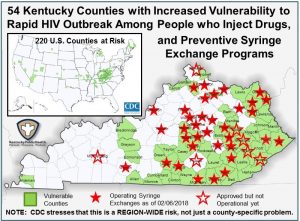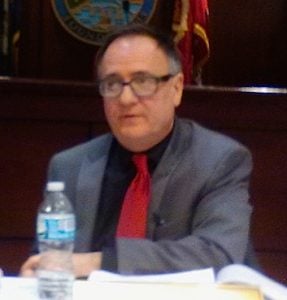By Don Owen
NKyTribune reporter
During the past year, the heroin epidemic has dramatically increased in many counties around Kentucky. With that, the continued use of dirty needles to inject the drug has caused concerns of a new HIV epidemic around the commonwealth.
As a result, Newport’s board of commissioners discussed the topic of the syringe exchange program at Monday night’s caucus meeting. The room was filled with concerned residents, many of whom spoke on the subject and how the epidemic of dirty needles is affecting lives regionally and statewide.
“There is a stigma attached to the idea of a needle, and the word ‘needle’ alone is off-putting,” said Newport commissioner Tom Guidugli, who has traveled to other cities and researched the topic. “I prefer to speak of it in terms that I’ve learned through the harm-reduction language, as ‘syringe access’ versus actual ‘needle exchange.’ People are more receptive of that information. I think the way we discuss this can build more buy-in with a larger group.

Newport commissioner Tom Guidugli (right) speaks to residents during Monday’s caucus meeting. Newport Mayor Jerry Peluso (wearing red tie) and city manager Thomas Fromme (center) are also pictured. (Photo by Don Owen)
Syringe exchange programs have existed and been studied extensively in the United States since 1988. They are community-based programs that provide access to sterile needles and syringes free of cost, facilitate safe disposal of used needles and syringes and offer safer injection education.
According to the Kentucky Cabinet for Health and Family Services, syringe exchange programs in Kentucky provide links to critical services and programs, including substance-use disorder treatment programs, and overdose prevention education.
“When I’m talking about harm-reduction, I’m not only speaking about the physical aspects,” Guidugli said. “This is also financial harm. It’s harming our institutions, hospitals and otherwise.”
Syringe exchange programs are designed to ease a number of public health issues, including emergence of a new HIV epidemic. One recent example is in an Indiana town near Louisville that encountered an HIV outbreak among people who inject drugs. That town, Austin, now has HIV rates comparable to those in sub-Saharan Africa.
“This isn’t just a local or regional issue, this is a national issue,” Newport Mayor Jerry Peluso said, noting the board will vote on three options concerning the syringe exchange program during its meeting on Feb. 26. “Our board has taken this issue very serious and we’ve studied it for nearly three years. I can tell you we’ve had a lot of discussion about the needle exchange, and I commend the board for taking on this issue.”
According to the Kentucky Cabinet for Health and Family Services, nearly half of Kentucky’s counties are at risk of an HIV outbreak. Recently the Center for Disease Control and Prevention analyzed every county in the United States to determine how vulnerable others might be to an HIV outbreak like the one in Indiana.
Of the 220 counties across the U.S. identified as highly vulnerable, 54 are in Kentucky. Kentucky also had some of the highest rates of hepatitis C in the nation for several years. Most of the new hepatitis C infections are from people who inject drugs and share needles, cookers and other contaminated equipment. Syringe exchange programs have proven capable of reducing the chance of an outbreak.“We cannot have dirty needles on the streets,” Guidugli said. “I can say there were more people in this room tonight in favor of the program than when I’m on the street in our community and neighborhoods. As people become educated and they learn the benefits, over time you can build buy-in to the program.”
Guidugli said Cincinnati’s harm-reduction exchange program, which operates in three sites with a mobile unit, ran on less than $40,000 per year. “In Kentucky there is a separate tax for the health board. As a resident of Newport, you will not see a direct impact on your taxes. It would tax the entire region.
“Now the cost of operating this can be exaggerated easily. The mobile unit run in the exchange program is a van. They actually do testing and provide all kinds of additional services to successfully execute the needs of their patients.”
Newport city manager Thomas Fromme also commended the board and said the members have “been very open-minded on this subject.”“I think this board has done a very good job of educating themselves,” Fromme said.
• In other items of note, Fromme said recent rumors that the FC Cincinnati soccer franchise could wind up in Newport “is just mere conjecture.” He added there is “nothing to update” regarding FC Cincinnati and the city of Newport.
• The Baptist Convalescent Home property in south Newport will be converted into an 88-unit Hyatt development. “This will be a great addition for south Newport,” Fromme said of the building that has been used as both a nursing home and an orphanage in the past.
The board of commissioners will convene again in a regular meeting on Feb. 26 at 7 p.m.


















